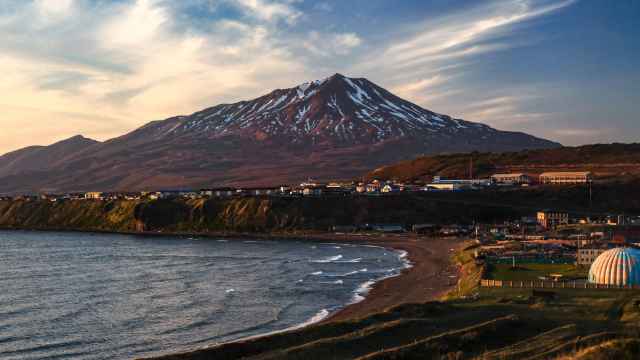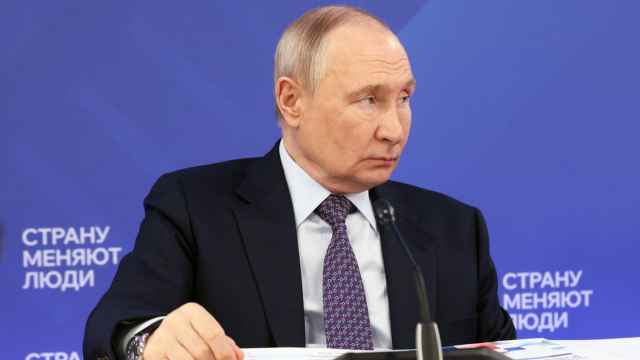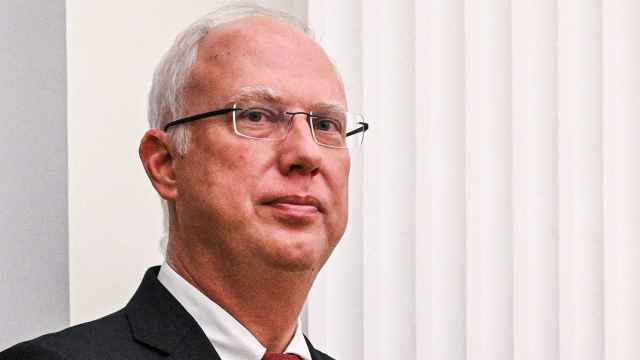BAIKONUR, Kazakhstan — Three astronauts on a Russian spaceship blasted off from the Baikonur Cosmodrome in Kazakhstan on a trip to the International Space Station.
The Soyuz TMA-20 spacecraft left at about 10:10 p.m. Wednesday Moscow time, carrying Russia's Dmitry Kondratyev, NASA astronaut Catherine Coleman and the European Space Agency's Paolo Nespoli of Italy. The capsule is due to dock at the orbiting space laboratory on Friday.
The flight caps a decade of manned missions to the space station, which began in October 2000.
Speaking ahead of the launch, Kondratyev shrugged off worries about the re-entry module of their Soyuz craft, which was hastily replaced earlier this month after it was damaged during unloading at the Baikonur.
"All the procedures needed to check the integrity of the ship have been completed, and all those have shown positive results," Kondratyev said at a final news conference ahead of the launch. "We have absolutely no doubts about the reliability of the craft and that the flight will take place as planned."
The coming year is set to see an intense burst of activity at the station, with the arrival of several cargo craft delivered by the U.S., Russian, European and Japanese space agencies.
The three astronauts will be at the space station in April to mark the 50th anniversary of Yury Gagarin's mission, the first human flight into space.
"As the crew that is onboard the International Space Station on this very special day, we won't be walking on the pages of history, we'll be floating," Coleman told reporters from behind a protective plate of glass. The crew is kept in strict isolation in the days ahead of the launch to avoid exposure to infection.
International space operations are set to enter a new phase next year while the U.S. shuttle fleet is mothballed. Two more shuttle missions are planned, after which the Soyuz will be the only vehicle available to transport crews to the orbiting laboratory. Some observers believe that Russia may seek to exploit the temporary Soyuz dominance to charge higher fees for carrying U.S. astronauts.
The White House wants NASA focused on next-generation rockets and spacecraft that could carry astronauts to asteroids and Mars, and to rely on private business to develop craft capable of ferrying cargo and crew to the space station. Last week, Space Exploration Technologies Inc. conducted a second test launch of its Dragon capsule, and safely guided it back to Earth for the first time.
The company plans to send Dragon to the station next summer and then build its piloted version to deliver crews there.
Federal Space Agency chief Anatoly Perminov on Wednesday welcomed Dragon's success, saying it would alleviate the burden of Russia's space program. "This will be very good for Russia, because by having a reserve vehicle, we will free up our own resources," he said.
Russia is currently contracted to carry NASA astronauts up to the end of 2012.
In an indication of the increasingly international flavor of space missions, the three astronauts flying Thursday all come from different countries — a development hailed by Nespoli.
"If we want to keep going on with this exploration, going back to moon or Mars … we need to put together all the resources that are around the world," he said.
Despite this diplomatic bonhomie, however, national differences may persist when it comes to culinary tastes.
Nespoli, a native of the northern Italian region of Lombardy, has been churning out a steady stream of messages on his Twitter account, including one jokingly complaining about a recent breakfast in Baikonur of over-boiled pasta and chicken.
"The problem is that, as Italians, we have a very strict way of eating, and that breakfast broke every single rule that we have," Nespoli told reporters.
A Message from The Moscow Times:
Dear readers,
We are facing unprecedented challenges. Russia's Prosecutor General's Office has designated The Moscow Times as an "undesirable" organization, criminalizing our work and putting our staff at risk of prosecution. This follows our earlier unjust labeling as a "foreign agent."
These actions are direct attempts to silence independent journalism in Russia. The authorities claim our work "discredits the decisions of the Russian leadership." We see things differently: we strive to provide accurate, unbiased reporting on Russia.
We, the journalists of The Moscow Times, refuse to be silenced. But to continue our work, we need your help.
Your support, no matter how small, makes a world of difference. If you can, please support us monthly starting from just $2. It's quick to set up, and every contribution makes a significant impact.
By supporting The Moscow Times, you're defending open, independent journalism in the face of repression. Thank you for standing with us.
Remind me later.





